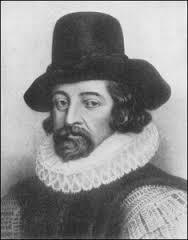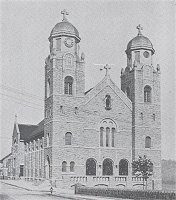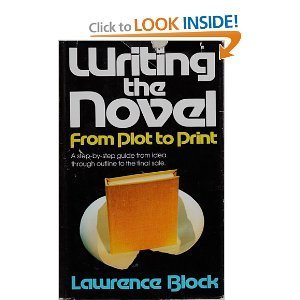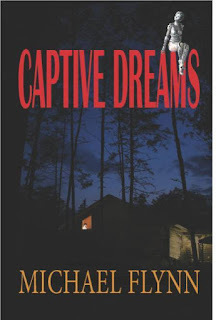Michael Flynn's Blog, page 38
May 12, 2012
The Horror and the Pity
Published on May 12, 2012 16:52
May 11, 2012
Giant Panda Attacks!
Published on May 11, 2012 20:14
May 9, 2012
My Pennsylvania Home
Published on May 09, 2012 22:12
May 8, 2012
Old Boskone Videos
A series of seven videos from several years ago of a panel I was on at Boskone regarding the rise of modern science.
Published on May 08, 2012 19:33
May 7, 2012
Captive Dreams
A starred review from Publishers Weekly for the forthcoming collection, Captive Dreams.
 Captive DreamsMichael Flynn. Arc Manor/Phoenix Pick (www.phoenixpick.com), $14.99 trade paper (266p) ISBN 978-1-61242-059-2Prometheus Award–winner Flynn (In the Lion’s Mouth) assembles six tales delving into deep melancholy and moral ambiguity. Each story builds from scientific what-ifs to a reality of human fragility and despair. In “Melodies of the Heart,” genetic conditions have a young girl aging too quickly and an old woman too slowly. In the title story, ideological differences hinder a young boy’s ability to make sense of afterimages and echoes floating in his brain. “Hopeful Monsters” pulls back the curtain on the world of designing babies. In “Places Where the Roads Don’t Go,” a lifelong friendship is strained when a heated debate over the nature of mind becomes more than talk. “Remember’d Kisses” explores science that offers to absolve emotional pain. In “Buried Hopes,” buried objects keep hope alive. While great writing, vivid scenarios, and thoughtful commentary outshine the scientific concepts, the stories will linger after the last page is turned. Agent: Eleanor Wood, Spectrum Literary Agency. (Aug.)
Captive DreamsMichael Flynn. Arc Manor/Phoenix Pick (www.phoenixpick.com), $14.99 trade paper (266p) ISBN 978-1-61242-059-2Prometheus Award–winner Flynn (In the Lion’s Mouth) assembles six tales delving into deep melancholy and moral ambiguity. Each story builds from scientific what-ifs to a reality of human fragility and despair. In “Melodies of the Heart,” genetic conditions have a young girl aging too quickly and an old woman too slowly. In the title story, ideological differences hinder a young boy’s ability to make sense of afterimages and echoes floating in his brain. “Hopeful Monsters” pulls back the curtain on the world of designing babies. In “Places Where the Roads Don’t Go,” a lifelong friendship is strained when a heated debate over the nature of mind becomes more than talk. “Remember’d Kisses” explores science that offers to absolve emotional pain. In “Buried Hopes,” buried objects keep hope alive. While great writing, vivid scenarios, and thoughtful commentary outshine the scientific concepts, the stories will linger after the last page is turned. Agent: Eleanor Wood, Spectrum Literary Agency. (Aug.)
Published on May 07, 2012 15:46
Notes from the Untergang
Published on May 07, 2012 11:04
May 5, 2012
Science-manque
The Masque of Science.Eddington is more agnostic about the material world than Huxley ever was about the spiritual world.
-- G. K. Chesterton, "The Well and the Shallows" Dedicated revolutionary
Dedicated revolutionary
1. The Rise of Modern Science
Ancients and medievals had studied Nature, but the Modern Ages were a time when Science could be spelled with a capital-S, and the mere act of wearing a white lab coat could endow the speaker with the magical ability to sell products on TV. Science, with its effort to describe the world “as it really was” went hand-in-glove with representation in the arts. Though which was the hand and which the glove is a fine point.
The medievals had sought to appreciate the beauty and interconnectedness of Nature -- how Her ends meshed with one another. But in the early 17th century, a number of remarkable men revolutionized the way in which science was done by wedding physics to mathematics and engineering in a ménage a trois.
Mathematics. Descartes believed that if physical theories were expressed in mathematical language, they could be proven with the same rigor as mathematical theorems! Engineering. Francis Bacon compared Aristotelian natural philosophers to little boys, who could talk, but not impregnate women [i.e., Nature] to bear children [i.e., useful products]. Descartes agreed that the purpose of science was not simply to learn about Nature, but to make men her “masters and possessors.” Read more »
-- G. K. Chesterton, "The Well and the Shallows"
 Dedicated revolutionary
Dedicated revolutionary1. The Rise of Modern Science
Ancients and medievals had studied Nature, but the Modern Ages were a time when Science could be spelled with a capital-S, and the mere act of wearing a white lab coat could endow the speaker with the magical ability to sell products on TV. Science, with its effort to describe the world “as it really was” went hand-in-glove with representation in the arts. Though which was the hand and which the glove is a fine point.
The medievals had sought to appreciate the beauty and interconnectedness of Nature -- how Her ends meshed with one another. But in the early 17th century, a number of remarkable men revolutionized the way in which science was done by wedding physics to mathematics and engineering in a ménage a trois.
Mathematics. Descartes believed that if physical theories were expressed in mathematical language, they could be proven with the same rigor as mathematical theorems! Engineering. Francis Bacon compared Aristotelian natural philosophers to little boys, who could talk, but not impregnate women [i.e., Nature] to bear children [i.e., useful products]. Descartes agreed that the purpose of science was not simply to learn about Nature, but to make men her “masters and possessors.” Read more »
Published on May 05, 2012 19:49
April 29, 2012
Church Repairs
Know Any Rich Benefactors?
 After a century of existence, TOF's parish church is in need of extensive structural repairs, more than its congregation of mostly poor and fixed incomers can plausibly raise. So if anyone out there knows Bill Gates or something, now's the time to give him a call.
After a century of existence, TOF's parish church is in need of extensive structural repairs, more than its congregation of mostly poor and fixed incomers can plausibly raise. So if anyone out there knows Bill Gates or something, now's the time to give him a call.
Our Lady of Mercy
Neepery about the building is below the cut. It would be a shame to lose it.
Read more »
 After a century of existence, TOF's parish church is in need of extensive structural repairs, more than its congregation of mostly poor and fixed incomers can plausibly raise. So if anyone out there knows Bill Gates or something, now's the time to give him a call.
After a century of existence, TOF's parish church is in need of extensive structural repairs, more than its congregation of mostly poor and fixed incomers can plausibly raise. So if anyone out there knows Bill Gates or something, now's the time to give him a call. Our Lady of Mercy
Neepery about the building is below the cut. It would be a shame to lose it.
Read more »
Published on April 29, 2012 20:08
Humanist or non-human?
Was Montaigne a Klingon?Inquiring minds want to know.
Published on April 29, 2012 16:53
April 26, 2012
The Writing Life: Ideas
Where Do You Get Your Ideas?
 Apologia pro blogpost suaMy perceptive Reader may recall from last July a blog post regarding Titles and what makes a good one. Fired with zeal to continue the series, I decided the next thing after Titles was the Idea for the story. Where do you get ‘em from? I often know where my own come from. Not always, but often enough. But only a fool estimates a population parameter from a sample of one. So some while back, 9 February to be exact, I sent requests to the Committee of Correspondence asking them for examples of their own stories and where they had gotten the ideas for them. You can’t tell just by reading the stories. Steven Crane got the idea for The Red Badge of Courage not from any experience of his own with war – he had none – but one day, after reading dryly written stories of famous Civil War battles and military leaders in Century Magazine, he reported thinking, "I wonder that some of those fellows don't tell how they felt in those scraps.” And this gave him the idea of capturing the emotions of combat. Alas, my intentions were temporarily blocked by my close brush with death, which I mentioned in an earlier blogpost while still somewhat in a stupor in my hospital room. One of the doctors said to me just last week on a follow-up visit, holding his forefinger and thumb in imitation of a micrometer measuring a very thin sheet of aluminum coil stock, “You were this close to being on the wrong side of the grass.” There’s a story in that phrase, somewhere. There is at least a title: "The Wrong Side of the Grass." In any case, I am only now getting back up to speed and something in my hindbrain jiggled and reminded me that I had saved the sundry responses, but had not assembled the essay. I hope the Correspondents will be understanding over the delay. The root of this essay is a slide show I put together for a meeting of the Writers’ Café of the Greater Lehigh Valley Writers’ Group, a.k.a. GLVWG, which is pronounced just as it’s spelled and is probably a town in Wales. The slide show in turn was based on materials gleaned from
Apologia pro blogpost suaMy perceptive Reader may recall from last July a blog post regarding Titles and what makes a good one. Fired with zeal to continue the series, I decided the next thing after Titles was the Idea for the story. Where do you get ‘em from? I often know where my own come from. Not always, but often enough. But only a fool estimates a population parameter from a sample of one. So some while back, 9 February to be exact, I sent requests to the Committee of Correspondence asking them for examples of their own stories and where they had gotten the ideas for them. You can’t tell just by reading the stories. Steven Crane got the idea for The Red Badge of Courage not from any experience of his own with war – he had none – but one day, after reading dryly written stories of famous Civil War battles and military leaders in Century Magazine, he reported thinking, "I wonder that some of those fellows don't tell how they felt in those scraps.” And this gave him the idea of capturing the emotions of combat. Alas, my intentions were temporarily blocked by my close brush with death, which I mentioned in an earlier blogpost while still somewhat in a stupor in my hospital room. One of the doctors said to me just last week on a follow-up visit, holding his forefinger and thumb in imitation of a micrometer measuring a very thin sheet of aluminum coil stock, “You were this close to being on the wrong side of the grass.” There’s a story in that phrase, somewhere. There is at least a title: "The Wrong Side of the Grass." In any case, I am only now getting back up to speed and something in my hindbrain jiggled and reminded me that I had saved the sundry responses, but had not assembled the essay. I hope the Correspondents will be understanding over the delay. The root of this essay is a slide show I put together for a meeting of the Writers’ Café of the Greater Lehigh Valley Writers’ Group, a.k.a. GLVWG, which is pronounced just as it’s spelled and is probably a town in Wales. The slide show in turn was based on materials gleaned from


· Structuring Your Novel: From Basic Idea to Finished Manuscript, by Robert Meredith and John Fitzgerald· Writing the Novel: From Plot to Print, by Lawrence BlockRead more »
 Apologia pro blogpost suaMy perceptive Reader may recall from last July a blog post regarding Titles and what makes a good one. Fired with zeal to continue the series, I decided the next thing after Titles was the Idea for the story. Where do you get ‘em from? I often know where my own come from. Not always, but often enough. But only a fool estimates a population parameter from a sample of one. So some while back, 9 February to be exact, I sent requests to the Committee of Correspondence asking them for examples of their own stories and where they had gotten the ideas for them. You can’t tell just by reading the stories. Steven Crane got the idea for The Red Badge of Courage not from any experience of his own with war – he had none – but one day, after reading dryly written stories of famous Civil War battles and military leaders in Century Magazine, he reported thinking, "I wonder that some of those fellows don't tell how they felt in those scraps.” And this gave him the idea of capturing the emotions of combat. Alas, my intentions were temporarily blocked by my close brush with death, which I mentioned in an earlier blogpost while still somewhat in a stupor in my hospital room. One of the doctors said to me just last week on a follow-up visit, holding his forefinger and thumb in imitation of a micrometer measuring a very thin sheet of aluminum coil stock, “You were this close to being on the wrong side of the grass.” There’s a story in that phrase, somewhere. There is at least a title: "The Wrong Side of the Grass." In any case, I am only now getting back up to speed and something in my hindbrain jiggled and reminded me that I had saved the sundry responses, but had not assembled the essay. I hope the Correspondents will be understanding over the delay. The root of this essay is a slide show I put together for a meeting of the Writers’ Café of the Greater Lehigh Valley Writers’ Group, a.k.a. GLVWG, which is pronounced just as it’s spelled and is probably a town in Wales. The slide show in turn was based on materials gleaned from
Apologia pro blogpost suaMy perceptive Reader may recall from last July a blog post regarding Titles and what makes a good one. Fired with zeal to continue the series, I decided the next thing after Titles was the Idea for the story. Where do you get ‘em from? I often know where my own come from. Not always, but often enough. But only a fool estimates a population parameter from a sample of one. So some while back, 9 February to be exact, I sent requests to the Committee of Correspondence asking them for examples of their own stories and where they had gotten the ideas for them. You can’t tell just by reading the stories. Steven Crane got the idea for The Red Badge of Courage not from any experience of his own with war – he had none – but one day, after reading dryly written stories of famous Civil War battles and military leaders in Century Magazine, he reported thinking, "I wonder that some of those fellows don't tell how they felt in those scraps.” And this gave him the idea of capturing the emotions of combat. Alas, my intentions were temporarily blocked by my close brush with death, which I mentioned in an earlier blogpost while still somewhat in a stupor in my hospital room. One of the doctors said to me just last week on a follow-up visit, holding his forefinger and thumb in imitation of a micrometer measuring a very thin sheet of aluminum coil stock, “You were this close to being on the wrong side of the grass.” There’s a story in that phrase, somewhere. There is at least a title: "The Wrong Side of the Grass." In any case, I am only now getting back up to speed and something in my hindbrain jiggled and reminded me that I had saved the sundry responses, but had not assembled the essay. I hope the Correspondents will be understanding over the delay. The root of this essay is a slide show I put together for a meeting of the Writers’ Café of the Greater Lehigh Valley Writers’ Group, a.k.a. GLVWG, which is pronounced just as it’s spelled and is probably a town in Wales. The slide show in turn was based on materials gleaned from


· Structuring Your Novel: From Basic Idea to Finished Manuscript, by Robert Meredith and John Fitzgerald· Writing the Novel: From Plot to Print, by Lawrence BlockRead more »
Published on April 26, 2012 21:25
Michael Flynn's Blog
- Michael Flynn's profile
- 237 followers
Michael Flynn isn't a Goodreads Author
(yet),
but they
do have a blog,
so here are some recent posts imported from
their feed.




